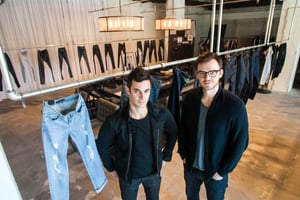
What’s in a name?
In the case of a West Hollywood online denim retailer formerly known as 20Jeans, it’s a faulty business model.
The two-year-old company, founded in 2012 by Corey Epstein, has rebranded itself as DSTLD (pronounced “distilled”) and stopped selling men’s jeans at the questionably low price of $20.
Now, it’s offering a range of premium denim jeans made in Los Angeles at prices between $65 and $95.
Epstein, DSTLD’s chief executive, said the changes weren’t driven by a fear that the business would go broke, but rather by a desire for a more efficient supply chain and better products.
Under the old model, 20Jeans bought overstock denim from downtown L.A.’s Fashion District and sent it to Hong Kong and Shanghai to be fabricated into men’s jeans.
Epstein was familiar with the market, having worked in China as a marketing consultant to textile manufacturers after receiving his M.B.A. from UCLA.
The cost was low, but he and partner Mark Lynn soon found they got what they paid for.
“We would reject up to 40 percent of our orders in our local quality-control check before shipping it out to customers,” he said. “That makes demand planning very difficult.”
So the pair crunched the numbers and didn’t like what they saw.
“We realized it was going to be really hard to build the business with the type of scale we wanted at that price point without sacrificing a lot on the quality side,” said Lynn, DSTLD’s president and co-founder. (Lynn also co-founded another L.A. e-commerce business, Club W, a wine delivery service that raised $9.5 million in September.)
The co-founders, who have raised $4.4 million in seed financing from Santa Monica’s Plus Capital and Wavemaker Ventures as well as Baroda Ventures in Beverly Hills, among several others, found support for the shift from their backers.
Plus Capital founder and Managing Partner Adam Lilling, a DSTLD investor, said he supported the company’s shift despite positive sales numbers under the old system.
“It wasn’t a pivot in terms of ‘We’re going to fail.’ It was ‘We think there’s a big opportunity going upstream,’ ” toward a higher price point, Lilling explained.
So far, they said, it’s working. That 40 percent rejection rate?
Now, it’s less than 5 percent, Epstein said.
Epstein said he and Lynn decided to start producing DSTLD clothes in downtown because of the area’s strong infrastructure when it comes to producing top-quality jeans.
While China still produces the majority of the products sold in the roughly $50 billion worldwide denim market, “L.A. produces 75 percent of the world’s premium denim,” he said.
DSTLD now imports its raw denim mostly from mills in Japan, Italy and Mexico before it’s sewn, stitched and washed here. So-called “premium” jeans are distinguished by higher-quality fabric and stitching, plus stylistic features such as “whiskers,” which give jeans that desired worn look.
“The wash houses here are the best in the world,” said Jon Levine, chief executive of Beverly Hills retail consulting firm Apparel Advisors. “With the wash houses in China, you don’t get the same results.”
It costs DSTLD between $30 and $40 to produce jeans that would sell at high-end department stores for much more than $65, according to Epstein.
“It’s a product that would retail at Nordstrom for $200 or $300,” he said.
But since DSTLD sells directly to consumers, the customers aren’t getting a second markup from retailers.
While Levine is a fan of DSTLD’s direct-to-consumer model, he said its margins are somewhat narrow considering many online consumers wind up sending jeans back.
“That’s a pretty tight model to really succeed at,” he said. “When people buy online, they often buy two sizes and return one” after finding out which one fits better.
Getting physical
DSTLD, which launched as an online-only store, has used its venture capital infusion to tweak both its manufacturing model and the market it is chasing. About half its employees still work in tech-related roles.
It has also expanded its product line, launching a women’s wear line in April and brought in former Gap Inc. design director Anh Vu to craft clothes. The company also opened a pop-up store last month to sell its 30 different items.
The retail store, called DNM Bar: LA, is located below its headquarters at 8899 Beverly Blvd. and will stay open until about March.
The co-founders wouldn’t rule out offering their clothes in other stores, though they haven’t yet found a way to do that while keeping the same price levels.
Lynn said the store is a great opportunity to introduce their clothes to new customers, but it’s also a chance to perform some market research.
“It’s another aspect of this iterative approach where we can try it, get data, talk to customers, see what their concerns are and what ideas they have,” said Lynn.
“That’s going to influence our medium- to long-term strategy.”
